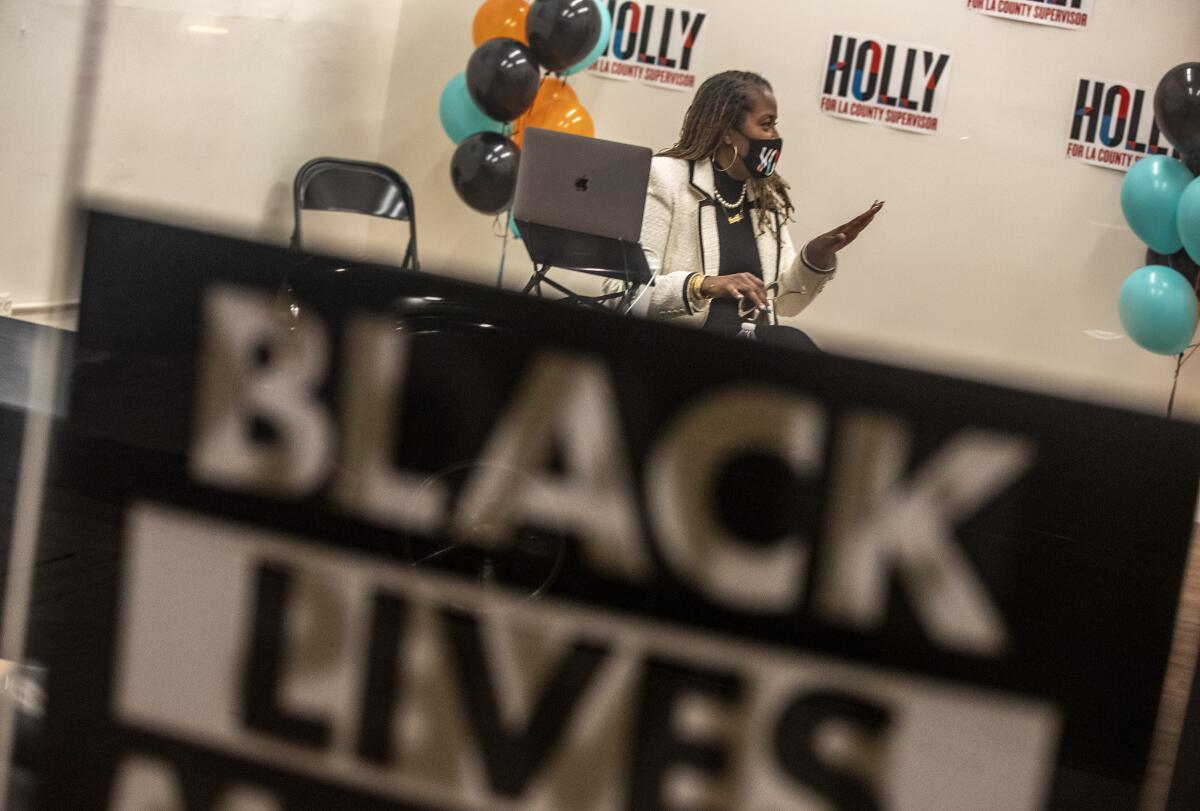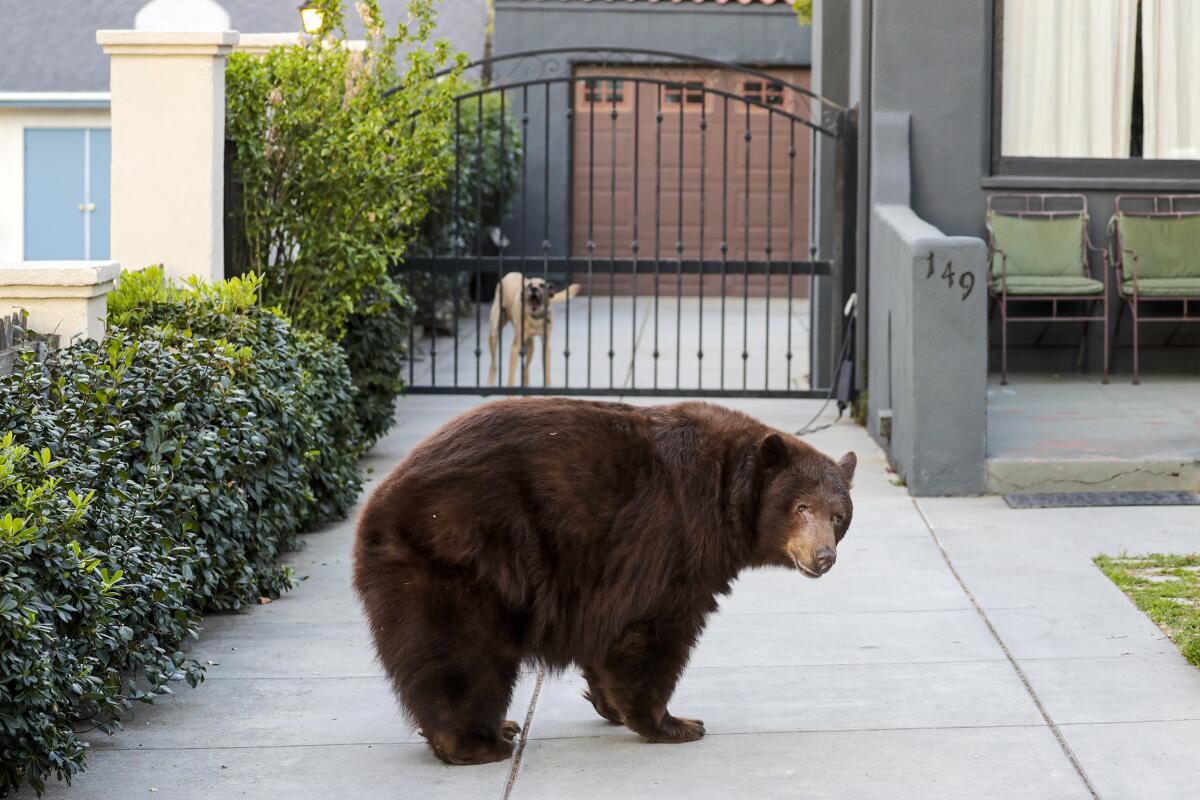Essential California: A growing enthusiasm for basic income programs

- Share via
Good morning, and welcome to the Essential California newsletter. It’s Friday, June 4. I’m Jaclyn Cosgrove, here in Los Angeles with my colleague Maggie May.
California appears to be leading the charge in experimenting with basic income programs for its residents.
I recently explored how the L.A. County Board of Supervisors was considering a universal basic income pilot program that would provide monthly payments of at least $1,000 to 1,000 residents for three years, no strings attached. Supervisors Holly Mitchell and Sheila Kuehl proposed the program, arguing the most populous county in America must fundamentally shift how it tackles anti-poverty policy.
The concept of universal basic income is fairly straightforward: provide regular payments to recipients without any requirement for how they spend the money or that they work. It has been around for decades.
In the 1970s, one of the largest experiments — the Seattle-Denver Income Maintenance Experiment, or SIME-DIME — provided 4,800 low-income families in the two cities with cash payments.
Reflecting on the program’s impact, Georgetown professor Karl Widerquist wrote in 2017 that much of the media and research attention around the program focused not on its goals but instead on a controversial, now debated, finding of a higher divorce rate among the control group. The Times story on the findings, published Dec. 13, 1978, started with an all caps heading: “MARRIAGES BREAK UP.”
“The higher divorce rate in some studies examining SIME-DIME was widely presented as a negative effect, even though the only explanation for it [was] that the (negative income tax) must have relieved women from financial dependence on husbands,” Widerquiest said. “It is at the very least questionable to label one spouse staying with another solely because of financial dependence as a ‘good’ thing.”
Fast forward to the 21st century, where women are seen as worthy regardless of their marital status, and the country is seeing the next wave of basic income programs.
Stockton has one of the best-known. Launched in early 2019, the program gave 125 randomly selected residents $500 a month for two years. During that two years, participants had greater success finding full-time employment and were healthier, suffering from lower rates of anxiety and depression.
Sign up for Essential California
The most important California stories and recommendations in your inbox every morning.
You may occasionally receive promotional content from the Los Angeles Times.
That program’s success inspired former Stockton Mayor Michael D. Tubbs to launch the organization Mayors for Guaranteed Income. Several California mayors have joined the group, including L.A. Mayor Eric Garcetti, who in April proposed a $24-million program that would provide $1,000 a month to 2,000 Los Angeles families for a year. Compton Mayor Aja Brown is also a member and helping lead the charge for the Compton Pledge that plans to pay $300 to $600 a month to 800 low-income city residents for two years.
In total, if each local program is funded, L.A. County will have 3,400 residents and families receiving some level of guaranteed income.
So what’s next for L.A. County’s program?
Mitchell and Kuehl’s motion passed, 4-1, and now mandates that the county chief executive’s office establish a plan in the coming months for the guaranteed income pilot program. It requires $36 million in funding, which the supervisors hope to get from federal money.
Supervisor Kathryn Barger, the only Republican on the five-member board, voted against the measure. Barger said she was worried about giving money without restrictions or fraud protections in place to an undefined group of residents.
“Our focus should be to provide care and resources that will help our entire foster youth population succeed before we expand social services to include a universal income,” Barger said.
Barger’s comments echo how many conservatives her age feel. A recent survey conducted by the Pew Research Center found a narrow majority of Americans, 54% of U.S. adults surveyed, who said they would oppose a federal universal basic income program.
Younger adults and people with lower incomes were more supportive. Interestingly, even though the concept is generally not well-liked among conservatives, 41% of Republicans ages 18 to 34 favor it, “by far the highest share of any GOP age group,” according to Pew.
It’ll be interesting to see how the conversation around universal basic income evolves in L.A. County and beyond as we attempt to rebuild our post-pandemic lives and economy.
And now, here’s what’s happening across California:
Note: Some of the sites we link to may limit the number of stories you can access without subscribing.
L.A. STORIES
Armed and drunk. A Times investigation found that, unlike law enforcement agencies across the country, the Los Angeles Police Department lacks an explicit policy that not only punishes armed off-duty officers who get intoxicated and into trouble but precludes them from carrying their weapons while intoxicated in the first place. This omission puts the LAPD at odds with other law enforcement agencies in the region and country. Los Angeles Times (This is story is exclusive to Times subscribers.)
Leaving Los Angeles. An estimated 10% of people living in L.A. County plan to move away in the next year, a USC study finds. L.A. residents are less satisfied with their quality of life compared to people throughout California and the U.S., but perceive less crime, vandalism, and drug and alcohol use in their neighborhoods than two years ago, according to the second annual USC Dornsife-Union Bank LABarometer livability survey. ABC7
F. Lee Bailey dies at 87. He was once the most famous trial attorney in the country, known for his lightning-quick mind, relentless courtroom interrogations and insatiable self-promotion. In 1995, Bailey was part of the “dream team” of attorneys who successfully represented O.J. Simpson at his murder trial in Los Angeles, a television spectacle that was rabidly absorbed by viewers coast to coast. Los Angeles Times
Lakers exit the playoffs. The Phoenix Suns eliminated the Lakers from the NBA playoffs after star Anthony Davis limped off the court midway through Game 6. Los Angeles Times
Support our journalism
THE CORONAVIRUS
A change to workplace masking mandates. A California safety board recommended relaxing workplace safety rules for people vaccinated against COVID-19, meaning that on June 15, employees will probably be able to take off their masks in a room if everyone there is vaccinated. Los Angeles Times
A “euphoric” rebound. California’s strict public health measures during the pandemic protected its economy, setting the stage for an even faster recovery in the state than nationwide, UCLA economists reported. Los Angeles Times
Dangerous misinformation. Myths about COVID-19 continue to proliferate in social media, concerning public health officials about how those mistruths are affecting vaccination rates. Los Angeles Times
POLITICS AND GOVERNMENT
A court order to pay. Former Rep. Katie Hill, who briefly represented northern L.A. County in Congress, has been ordered to pay about $220,000 in attorneys’ fees to a British tabloid and two conservative journalists she sued in her unsuccessful revenge porn lawsuit. Hill accused them of violating the law by publishing intimate pictures without her consent. Los Angeles Times
Fresno, free speech and LGBTQ Pride flags. In an ongoing saga over whether Fresno should fly a rainbow flag at its City Hall in acknowledgement of Pride month, Mayor Jerry Dyer proposed an alternative — installing several flagpoles at a park where the city could fly a variety of flags. Advocates and LGBTQ residents argued the idea felt “separate but not equal.” Fresno Bee
$11-billion solution. A leading research organization is boldly putting a dollar amount on what it thinks it would take to whisk every unhoused person in the Bay Area off the streets: $11.8 billion. San Francisco Chronicle
HEALTH AND THE ENVIRONMENT
A botched plan. State regulators ordered Southern California Edison to significantly change how the utility cuts customers’ power in high fire risk zones on red flag alert days. The Public Utilities Commission said Edison did a poor job communicating with the public and didn’t provide adequate support to customers left in the dark. LAist
Our wild neighbors. Gov. Gavin Newsom’s budget proposal includes millions in funding to help the California Department of Fish and Wildlife better address the increasing encounters city dwellers are having with bears, cougars and coyotes. Sacramento Bee

Abandoned eggs. Two drones illegally flown over the biggest nesting island for least terns in Huntington Beach’s Bolsa Chica wetlands spooked several thousand birds and prompted them to abandon their nests, leaving behind about 3,000 eggs. There will be no hatchlings this year on the sand-covered island, which is now littered with the egg shells. In more than 20 years, conservationists have never seen such a large-scale abandonment of eggs there. Orange County Register
CALIFORNIA CULTURE
An overdue library item. A San Francisco man recently returned a Bob Dylan album to a library — 48 years overdue. Howard Simon noticed a copy of “Self Portrait,” which he had checked out from the University Heights Library in Ohio in 1973 and never returned. San Francisco Chronicle
Waiting on that Nike apology. Vanessa Bryant posted on Instagram early Thursday, upset that a pair of sneakers she worked on with Nike in honor of her daughter Gianna were released to the public without her consent. Los Angeles Times

Free online games
Get our free daily crossword puzzle, sudoku, word search and arcade games in our new game center at latimes.com/games.
CALIFORNIA ALMANAC
Los Angeles: sunny, 78. San Diego: partly cloudy, 69. San Francisco: cloudy, 62. San Jose: partly cloudy, 76. Fresno: sunny, 102. Sacramento: mostly sunny, 94.
AND FINALLY
Today’s California memory comes from Katey O’Neill:
My family lived in Playa del Rey in the early 1960s, when I was in high school. I learned to surf at Dockweiler Beach, just three blocks from our house. Our suburban neighborhood, which no longer exists, bordered the L.A. International Airport safety zone at the time. People who visited would always ask, “How can you stand that noise?”, when we would have to stop our conversations every two minutes as a jet flew low overhead. We got used to the noise. Sometime after my parents sold that home and I had gone off to college, LAX extended their safety zone. The house my family had lived in and the entire neighborhood were demolished. A few years later I took a jet from LAX that flew over that Playa del Rey neighborhood. I was amazed to look down from the jet and see only streets, sidewalks, and sand dunes. All the houses were gone. My old neighborhood had quickly reverted back to nature.
If you have a memory or story about the Golden State, share it with us. (Please keep your story to 100 words.)
Please let us know what we can do to make this newsletter more useful to you. Send comments to [email protected].
Sign up for Essential California
The most important California stories and recommendations in your inbox every morning.
You may occasionally receive promotional content from the Los Angeles Times.




